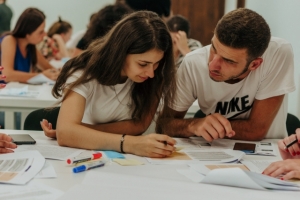Electing More Women is Focus of Youth Social Campaign
UNDP and Sweden support awareness-raising among first-time voters.
The upcoming parliamentary elections offer Georgia a chance to vote more women into office, overcoming a long-standing gender disparity in political representation. In support of greater openness to women in politics, the United Nations Development Programme (UNDP) and the Government of Sweden are assisting civil society activists in Georgia’s regions to educate first-time voters about democratic elections and gender equality.
“There is no shortage of smart, capable women leaders in Georgia,” said UNDP Head Louisa Vinton. “But we can see that parties remain reluctant to put them on their electoral lists. Georgia’s new electoral gender quota, though still very modest in its ambitions for the Parliament, is one way to overcome this reserve, but we also need to work to combat negative stereotypes and prejudices, particularly among the younger generation.”
“The last parliamentary elections gave women only 15 percent of seats in the Parliament. This year, Georgia has a real chance to bring more women into the political process and generate a more representative legislature. This would advance Georgia’s democracy, development and European integration,” Ambassador of Sweden Ulrik Tideström said. “Yet we see the need for continuous public discussion to dispel the gender clichés prevailing in society.”
With support from UNDP and Sweden, 45 young people from the Kakheti and Samegrelo regions took part in a series of workshops on Georgia’s current electoral system, the barriers to gender equality in politics and the participatory tools that can increase women’s representation. Ten selected participants received GEL 3,000 each to conduct civic education campaigns among their peers to send a message that women leaders are the norm.
Women's participation in Georgia’s parliament has been stagnating over the past 25 years, with the share of seats rising from 7% in 1995 to just 15 percent after the last elections in 2016. Women’s participation in elected local government bodies is even lower, hovering at 12% after the last local elections in 2017.
Globally the average is higher, at 25.1%, but still a long way from the 30% target set 25 years ago in the Beijing Declaration and later in Agenda 2030.
According to a recent UNDP survey, 60% of Georgians are confident that greater involvement of women in politics would benefit their country. More than half of all Georgians – 63% of women and 54% of men – think Georgia has yet to achieve meaningful gender equality. Yet 59% of men and 38% of women still believe that women’s primary duty is to take care of their families rather than seek a career.
UNDP supports the political and economic empowerment of Georgian women as part of the Sweden-funded UN Joint Programme for Gender Equality, an initiative working to promote gender equality in all spheres of life.
Image: Irakli Gamsakhurdia/AGC/UNDP












